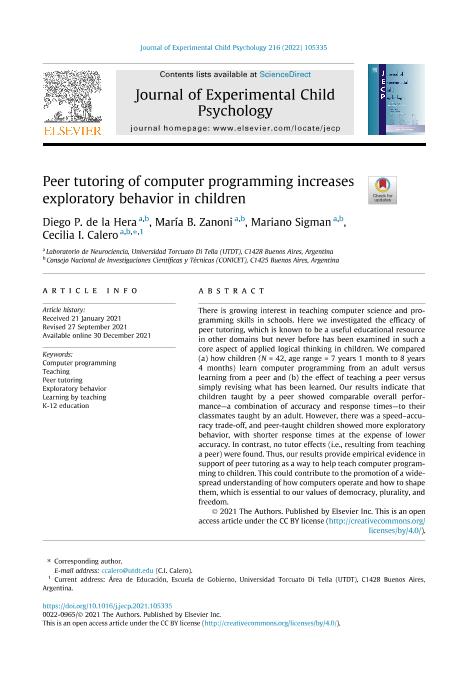Artículo
Peer tutoring of computer programming increases exploratory behavior in children
Fecha de publicación:
04/2022
Editorial:
Elsevier
Revista:
Journal of Experimental Child Psychology
ISSN:
0022-0965
Idioma:
Inglés
Tipo de recurso:
Artículo publicado
Clasificación temática:
Resumen
There is growing interest in teaching computer science and programming skills in schools. Here we investigated the efficacy of peer tutoring, which is known to be a useful educational resource in other domains but never before has been examined in such a core aspect of applied logical thinking in children. We compared (a) how children (N = 42, age range = 7 years 1 month to 8 years 4 months) learn computer programming from an adult versus learning from a peer and (b) the effect of teaching a peer versus simply revising what has been learned. Our results indicate that children taught by a peer showed comparable overall performance—a combination of accuracy and response times—to their classmates taught by an adult. However, there was a speed–accuracy trade-off, and peer-taught children showed more exploratory behavior, with shorter response times at the expense of lower accuracy. In contrast, no tutor effects (i.e., resulting from teaching a peer) were found. Thus, our results provide empirical evidence in support of peer tutoring as a way to help teach computer programming to children. This could contribute to the promotion of a widespread understanding of how computers operate and how to shape them, which is essential to our values of democracy, plurality, and freedom.
Archivos asociados
Licencia
Identificadores
Colecciones
Articulos(SEDE CENTRAL)
Articulos de SEDE CENTRAL
Articulos de SEDE CENTRAL
Citación
de la Hera, Diego Pablo; Zanoni Saad, María Belén; Sigman, Mariano; Calero, Cecilia Ines; Peer tutoring of computer programming increases exploratory behavior in children; Elsevier; Journal of Experimental Child Psychology; 216; 4-2022; 1-18
Compartir
Altmétricas




